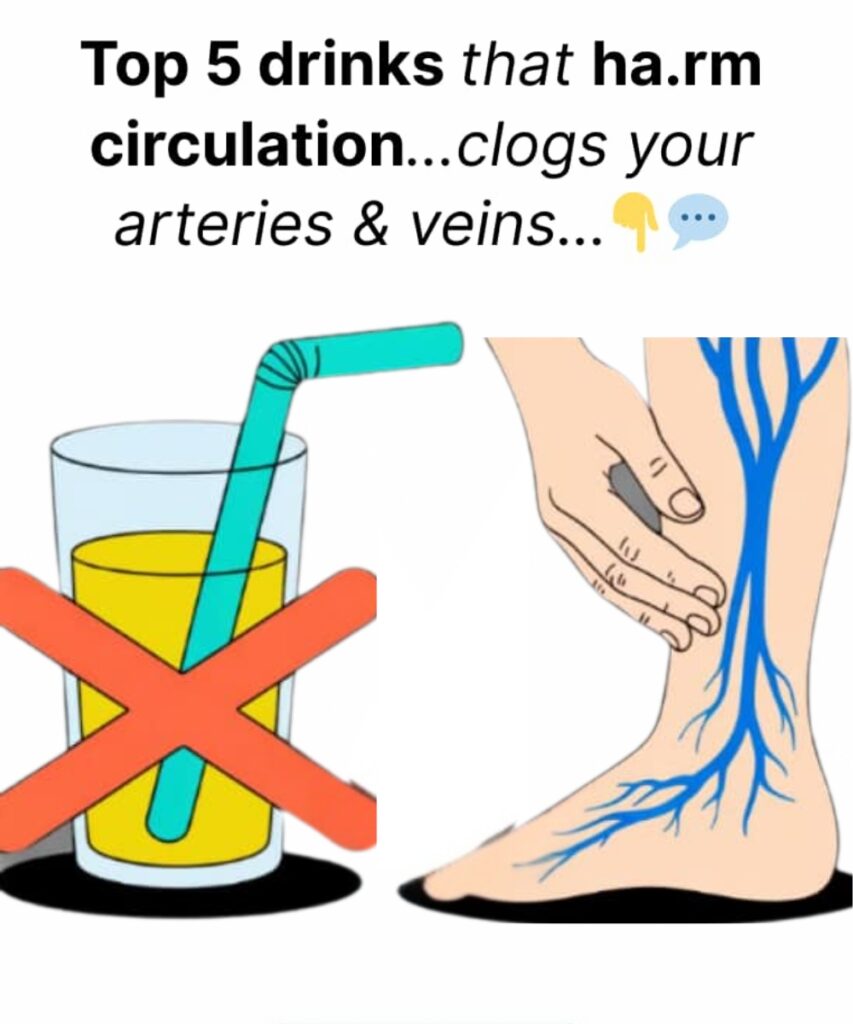
What Your Daily Drinks Could Be Doing to Your Heart and Circulation
Many everyday beverages might seem harmless, even refreshing—but over time, some of them can quietly sabotage your circulation and increase the risk of serious conditions like high blood pressure, diabetes, fatty liver disease, heart attacks, strokes, and kidney problems.
The Hidden Danger
The real concern lies in how these issues develop silently. You may feel fine on the outside while your arteries and organs suffer gradual, unseen damage.
Why Circulation Matters More Than You Think
Take high blood pressure—often called the “silent killer.” It places continuous strain on your artery walls, forcing your heart to work harder. Over time, this can lead to serious complications like:
- Heart failure
- Kidney damage
- Atherosclerosis (plaque buildup that narrows the arteries)
- Increased risk of heart attack or stroke
- Blood clots that may lead to pulmonary embolisms
The good news? Small changes to your beverage choices can make a big difference.
5 Drinks to Limit or Avoid for Better Circulatory Health
1. Sugary Beverages
Sodas, sweet teas, bottled coffees, energy drinks, and flavored waters are packed with added sugars and sodium. These drinks contribute to:
- Obesity
- Insulin resistance and type 2 diabetes
- Hypertension (high blood pressure)
- Fat accumulation in the liver
According to a long-term study in Circulation, drinking just one sugary beverage a day increases the risk of heart attack or death by 20%. Another study found that daily soda drinkers had nearly twice the risk of developing type 2 diabetes.
Even a healthy meal, like grilled salmon and vegetables, loses its impact when paired with a sugary soda.
Healthier swaps: plain water, sparkling water with lemon, herbal teas, or smoothies made with unsweetened plant-based milk.
2. Excessive Alcohol
While moderate alcohol—particularly red wine—has been linked to some heart benefits, drinking too much causes more harm than good. Overconsumption can:
- Raise blood pressure
- Weaken the heart muscle
- Accelerate plaque buildup in arteries
- Trigger irregular heartbeats and strokes
- Inhibit nutrient absorption and promote inflammation
Stick to moderation: one drink per day for women, two for men. Binge drinking—even once a week—can cause serious damage.
3. Fruit Juices
Many believe fruit juice is a healthy choice, but most commercial juices are stripped of fiber and overloaded with natural sugars. Even 100% juice spikes blood sugar quickly and lacks the full benefits of whole fruits.
Tip: Eat whole fruit whenever possible. If you juice, include the pulp and peel to retain fiber and slow sugar absorption.
4. Highly Caffeinated Drinks
Energy drinks and overly strong coffees can increase blood pressure, disrupt heart rhythms, and interfere with sleep. Long-term overuse is linked to:
- Elevated cholesterol
- Cardiovascular disease
- Increased diabetes risk
Many of these drinks also contain sugar, compounding the risks. If you’re consuming multiple cups or cans daily, it’s time to cut back.
Better alternatives: decaf coffee, or herbal teas like chamomile, hibiscus, or rosemary, which support circulation without side effects.
5. Artificially Sweetened Drinks
Diet sodas and sugar-free energy drinks may be low in calories, but their artificial sweeteners (like aspartame and sucralose) can:
- Disrupt your metabolism
- Harm gut bacteria
- Reduce insulin sensitivity
- Increase the risk of metabolic disorders
For a safer sweet fix, try drinks made with natural alternatives like stevia or monk fruit.
Final Thoughts: Small Sips, Big Results
If you’re struggling with high blood pressure, fatigue, poor circulation, or blood sugar issues, your beverage habits might be playing a bigger role than you realize.
Medications can manage symptoms—but true health starts with daily choices. Rethinking what you drink could be the first step to stronger circulation, a healthier heart, and a longer life.
Let me know if you’d like a shorter version for social media or a visual infographic layout.


